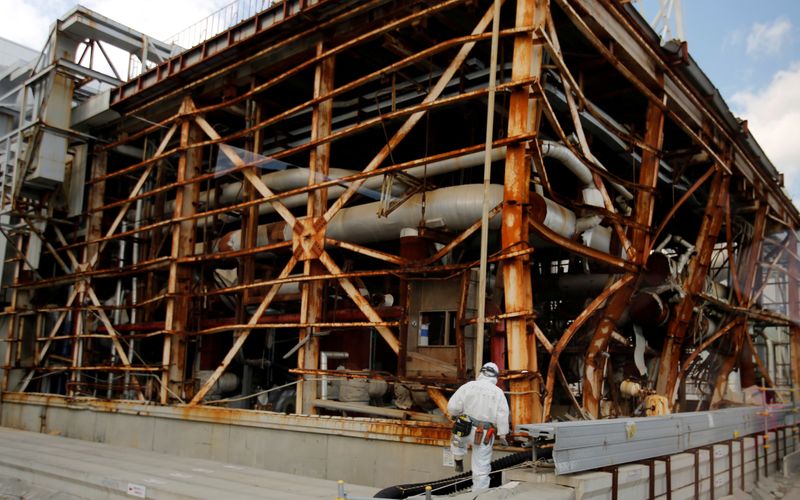By Linda Sieg
TOKYO (Reuters) - When a huge earthquake and tsunami struck Japan on March 11, 2011, devastating towns and triggering nuclear meltdowns in Fukushima, a stunned world watched the chaotic struggle to contain the world's worst nuclear disaster since Chernobyl.
An onslaught of waves sparked by the 9.0-magnitude quake crashed into the northeastern coast, killing nearly 20,000 people and crippling the Fukushima Dai-ichi plant. More than 160,000 residents fled as radiation spewed into the air.
At the time, some - including Prime Minister Naoto Kan - feared Tokyo would need to be evacuated, or worse.
"Fukushima is stamped for the rest of the history of nuclear energy," said Kiyoshi Kurokawa, head of an investigation that concluded the disaster was "profoundly man-made".
The government has spent about $300 billion (32.1 trillion yen) to rebuild the tsunami-devastated Tohoku region, but areas around the Fukushima plant remain off-limits, worries about radiation levels linger and many who left have settled elsewhere. Decommissioning of the crippled plant will take decades and billions of dollars.
Japan is again debating the role of nuclear power in its energy mix as the resource-poor country aims to achieve net carbon neutrality by 2050 to fight global warming. But an NHK public TV survey showed 85% of the public worries about nuclear accidents.
Energy policy was left in limbo after Shinzo Abe led his pro-nuclear energy Liberal Democratic Party (LDP) back to power the year after the disaster, ousting the novice Democratic Party of Japan, whose image was tainted by its handling of Fukushima.
"They sort of left things adrift," said Tobias Harris, senior vice president at consultancy Teneo and author of a book about Abe.
'RESULT OF COLLUSION'
Kurokawa's commission, appointed by parliament, concluded in 2012 that the Fukushima accident was "the result of collusion between the government, regulators and Tokyo Electric Power Co" and a lack of governance.
Abe resigned last year, citing poor health, and his successor, Yoshihide Suga, has announced a goal of net carbon neutrality by 2050.
Proponents say nuclear power is vital to decarbonization. Critics say cost, safety and the challenge of storing nuclear waste are all reasons to avoid it.
"Those talking about atomic power are people in the 'nuclear village', who want to protect their vested interests," former Prime Minister Kan told a news conference last week.
The mass demonstrations against nuclear power seen in the wake of 3/11 have faded, but distrust lingers.
A February Asahi newspaper survey found that nationwide, 53% are opposed to restarting reactors, compared with 32% in favour. In Fukushima, only 16% backed bringing restarting units.
"Ten years have passed and some people have forgotten. The zeal is gone," said Yu Uchiyama, a University of Tokyo political science professor. "Restarts are not happening, so people think if they just wait, nuclear power will disappear."
NUCLEAR FUTURE BLEAK?
Only nine of Japan's 33 remaining commercial reactors have been approved for restarts under post-Fukushima safety standards and only four are operating, compared with 54 before the disaster.
Nuclear power supplied just 6% of Japan's energy needs in the first half of 2020 compared with 23.1% for renewable sources - far behind Germany's 46.3% - and nearly 70% for fossil fuels.
Extending the lifespan of Japan's 33 existing commercial reactors to 60 years, there would be only 18 in 2050 and none by 2069, said Takeo Kikkawa, an adviser to the government on energy policy. Newer business lobbies are pushing for renewable energy.
"Japan is a resource-poor country so we should not casually abandon the nuclear option," Kikkawa told a media briefing. "But in reality, the future of nuclear power is bleak."
(1 Japanese yen = $0.0094)
